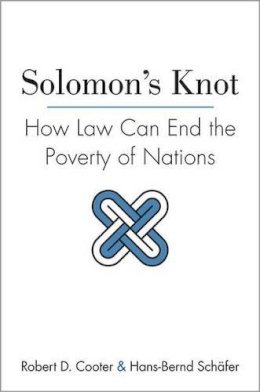
Stock image for illustration purposes only - book cover, edition or condition may vary.
Solomon´s Knot: How Law Can End the Poverty of Nations
Robert D. Cooter
€ 65.50
FREE Delivery in Ireland
Description for Solomon´s Knot: How Law Can End the Poverty of Nations
Hardback. Developing a new idea requires money, which poses a problem of trust. This title proposes a legal theory of economic growth that details how property, contract, and business laws help to unite capital and ideas. It demonstrates why ineffective private and business laws are the root cause of the poverty of nations in today's world. Series: The Kauffman Foundation Series on Innovation and Entrepreneurship. Num Pages: 344 pages, 21 line illus. 29 tables. BIC Classification: KCG; LNC. Category: (P) Professional & Vocational; (U) Tertiary Education (US: College). Dimension: 229 x 152 x 30. Weight in Grams: 606.
Sustained growth depends on innovation, whether it's cutting-edge software from Silicon Valley, an improved assembly line in Sichuan, or a new export market for Swaziland's leather. Developing a new idea requires money, which poses a problem of trust. The innovator must trust the investor with his idea and the investor must trust the innovator with her money. Robert Cooter and Hans-Bernd Schafer call this the "double trust dilemma of development." Nowhere is this problem more acute than in poorer nations, where the failure to solve it results in stagnant economies. In Solomon's Knot, Cooter and Schafer propose a legal theory of economic growth that details how effective property, contract, and business laws help to unite capital and ideas. They also demonstrate why ineffective private and business laws are the root cause of the poverty of nations in today's world. Without the legal institutions that allow innovation and entrepreneurship to thrive, other attempts to spur economic growth are destined to fail.
Product Details
Publisher
Princeton University Press
Format
Hardback
Publication date
2012
Series
The Kauffman Foundation Series on Innovation and Entrepreneurship
Condition
New
Number of Pages
342
Place of Publication
New Jersey, United States
ISBN
9780691147925
SKU
V9780691147925
Shipping Time
Usually ships in 15 to 20 working days
Ref
99-15
About Robert D. Cooter
Robert D. Cooter is the Herman F. Selvin Professor of Law at the University of California, Berkeley. His books include "The Strategic Constitution" (Princeton). Hans-Bernd Schafer is professor of law and economics at the Bucerius Law School in Hamburg, Germany, and professor emeritus at the University of Hamburg. His books include "The Economic Analysis of Civil Law".
Reviews for Solomon´s Knot: How Law Can End the Poverty of Nations
"Cooter and Schafer apply insights from the field of law and economics to the problem of poverty. They describe how institutions like contracts overcome dilemmas of trust at the heart of economic transactions. Readers interested in understanding the law and economics approach would do well to start with this well-written volume, which develops a model of the legal institutions needed for innovation... [A] significant contribution to the field."
Choice "[C]ompelling."
Michael Strong, Barron's "Rich in institutional detail, wisdom and practical advice."
Alex Tabarrok, Marginal Revolution "The authors, Cooter and Schafer, skilfully avoid economics verbiage and complicated legal terms, providing instead a plethora of anecdotes, appropriate examples and studies."
Lisa Kaaki, Arab News "Solomon's Knot remains an entertaining and comprehensive read. It successfully conveys the main theories of law and economics within the context of promoting innovation as a source of sustained growth. Moreover, it proposes clear and simple policy recommendations for developing countries to adopt in pursuit of greater wealth creation and economic development."
Christel Y. Tham, Journal of International Law and Politics
Choice "[C]ompelling."
Michael Strong, Barron's "Rich in institutional detail, wisdom and practical advice."
Alex Tabarrok, Marginal Revolution "The authors, Cooter and Schafer, skilfully avoid economics verbiage and complicated legal terms, providing instead a plethora of anecdotes, appropriate examples and studies."
Lisa Kaaki, Arab News "Solomon's Knot remains an entertaining and comprehensive read. It successfully conveys the main theories of law and economics within the context of promoting innovation as a source of sustained growth. Moreover, it proposes clear and simple policy recommendations for developing countries to adopt in pursuit of greater wealth creation and economic development."
Christel Y. Tham, Journal of International Law and Politics
